Have you ever wondered which links on your website are getting the most attention from your visitors? Understanding how users interact with your site’s links can provide invaluable insights for your digital marketing strategy. That’s where Google Analytics click tracking comes in!
Click tracking allows you to see exactly which links your visitors are clicking on, whether they’re navigation menu items, call-to-action buttons, affiliate links, or any other clickable elements on your site. This data can help you make informed decisions about your website’s design, content placement, overall user experience, and digital marketing strategy.
In this comprehensive guide, we’ll walk you through the process of setting up Google Analytics click tracking. Whether you’re using WordPress or another platform, we’ve got you covered with step-by-step instructions and helpful tips.
Why Use Google Analytics 4 to Track Clicks?
It’s essential to track clicks in Google Analytics 4 because having that data can help you make significant improvements to your website that move the needle. If you don’t know what’s working and what’s not on your website, it’s tough to make the right improvements!
With link click tracking, you’re adding a whole new level of invaluable report data that you can use to grow your business and make more money.
Let’s see a few examples:
- Affiliate link clicks will lead your users to buy your referral products and let you earn some referral income.
- Add to Cart clicks will lead customers to buy a product from your store.
- Form Submit clicks will let your users send a message using your online contact form.
- File download links will let users download files from your site.
- Outbound links will redirect your readers to other websites (resources) you suggest they visit.
- Call-to-action clicks will take your users to your product landing pages, donate pages, or another critical conversion page.
- Click-to-call links are great for generating calls from users on mobile devices.
- Video play clicks are fantastic to track, so you know if your visitors are watching your videos.
Tracking these link clicks can help you understand how exactly your users navigate and interact with your site.
For instance, if you track link clicks in Google Analytics, you can find out which outbound or affiliate links are getting clicked, which forms are getting submitted the most often, how many visitors are clicking to call you, and more. Then, you can analyze the reports and make improvements.
After you’ve optimized your links and buttons, they’re sure to get more visibility and more engagement and generally increase your good SEO signals. Your site conversions will likely increase significantly when users are more engaged on your site.
In a nutshell, Google Analytics click tracking can help you to understand precisely how your users interact on your site so that you can make informed decisions that lead to business growth.
How to Track Clicks in Google Analytics 4
Google Analytics 4 can provide you with many of your website’s essential metrics and comes with built-in tracking for certain click events, but it only tracks some of them. It also offers enhanced measurement for click tracking, but not all features work as expected. Plus, building the event report you need to help you understand your data gets tricky.
If you’re unfamiliar with Google Analytics 4, you might need to hire an expert or developer to help you set up click tracking.
That’s why we recommend using a tool like Google Tag Manager (GTM) or MonsterInsights to easily track your events and click metrics.
Google Tag Manager is a free tool from Google that helps you set up bits of tracking code without needing to embed them into your site’s code. Once you install the initial code, or “container,” you can continue adding tracking features without modifying the code.
However, the biggest drawback to using GTM is the learning curve. In order to set up different tracking features, you’ll need to learn how to create triggers and tags that track what you want to track.
While it is possible to follow different tutorials and learn how to use Google Tag Manager effectively, we will show you a much easier way to track link clicks in GA4 and WordPress: MonsterInsights.
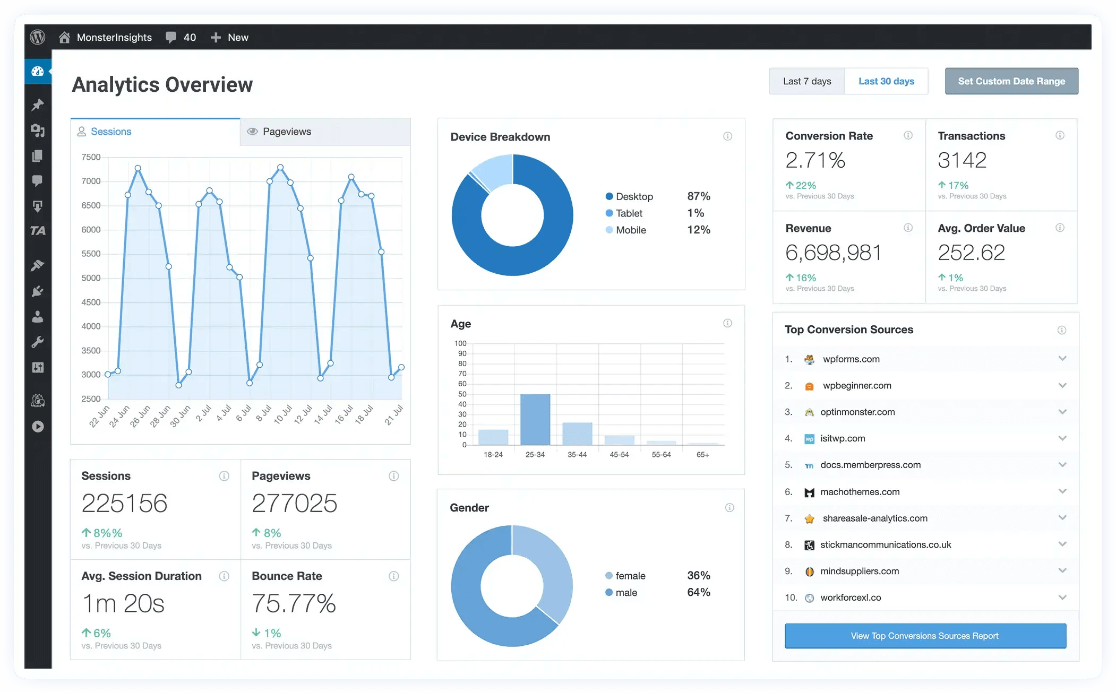
MonsterInsights makes the entire process of using Google Analytics in WordPress super simple so that anyone can easily set up Google Analytics and configure advanced tracking.
Just follow these steps to set up link click tracking in Google Analytics. Or, jump down to the Google Tag Manager instructions.
Step 1: Install MonsterInsights on Your WordPress Site
To get started, you’ll need to download MonsterInsights and install it on your WordPress.
The setup files are in your account area under the Downloads tab.
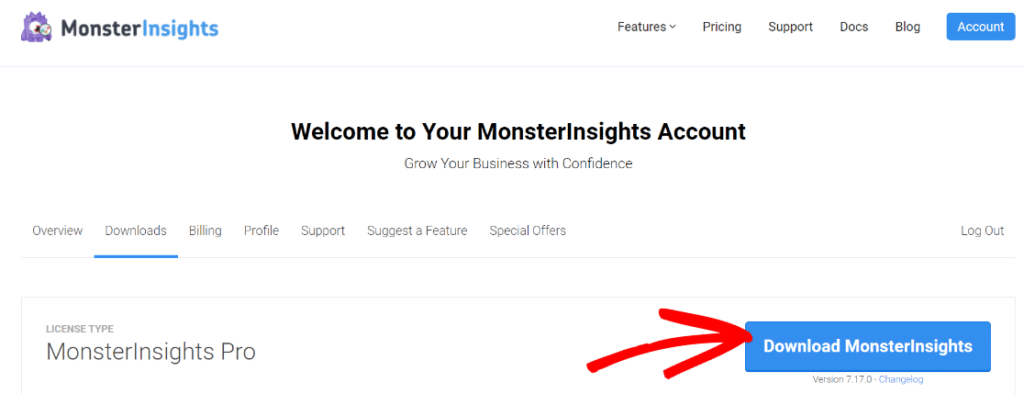
After downloading MonsterInsights, upload the ZIP files to WordPress. You can do that by going to Plugins » Add New » Upload Plugin.
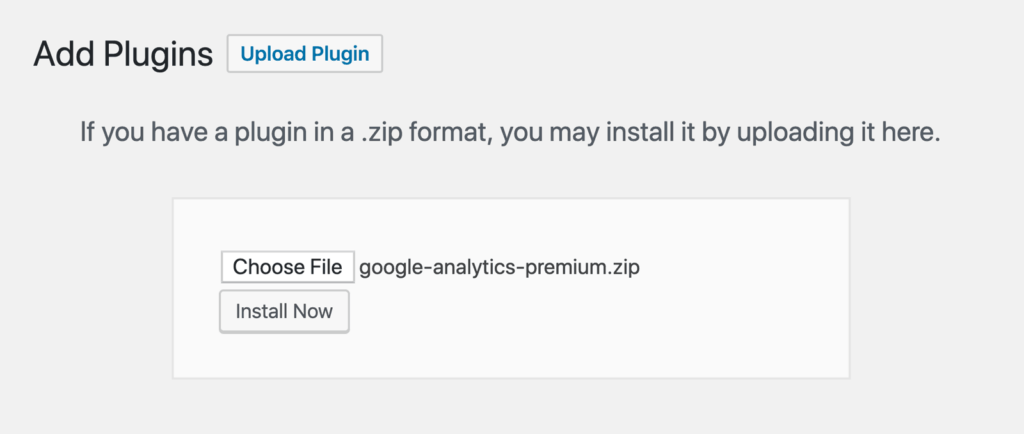
Next, install the plugin and click the Activate Plugin button.
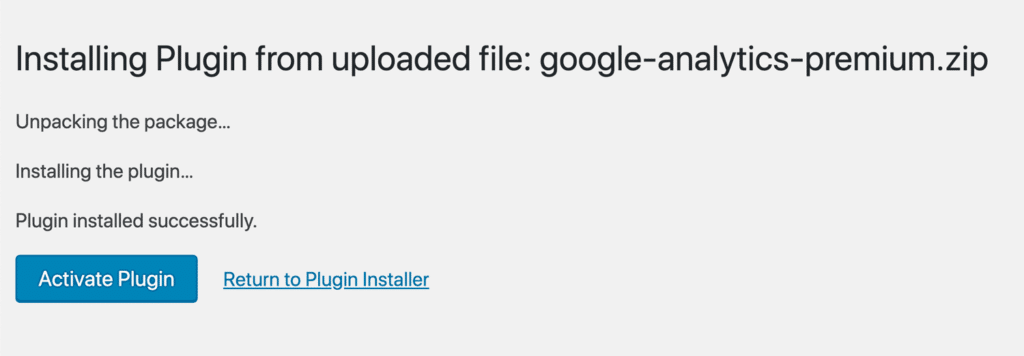
Step 2: Connect Google Analytics with MonsterInsights
After activating MonsterInsights, you must connect your site with your Google Analytics account.
MonsterInsights makes this process effortless, as you don’t have to hire a developer or touch a single line of code. You can add the tracking code to your website in no time using its setup wizard.
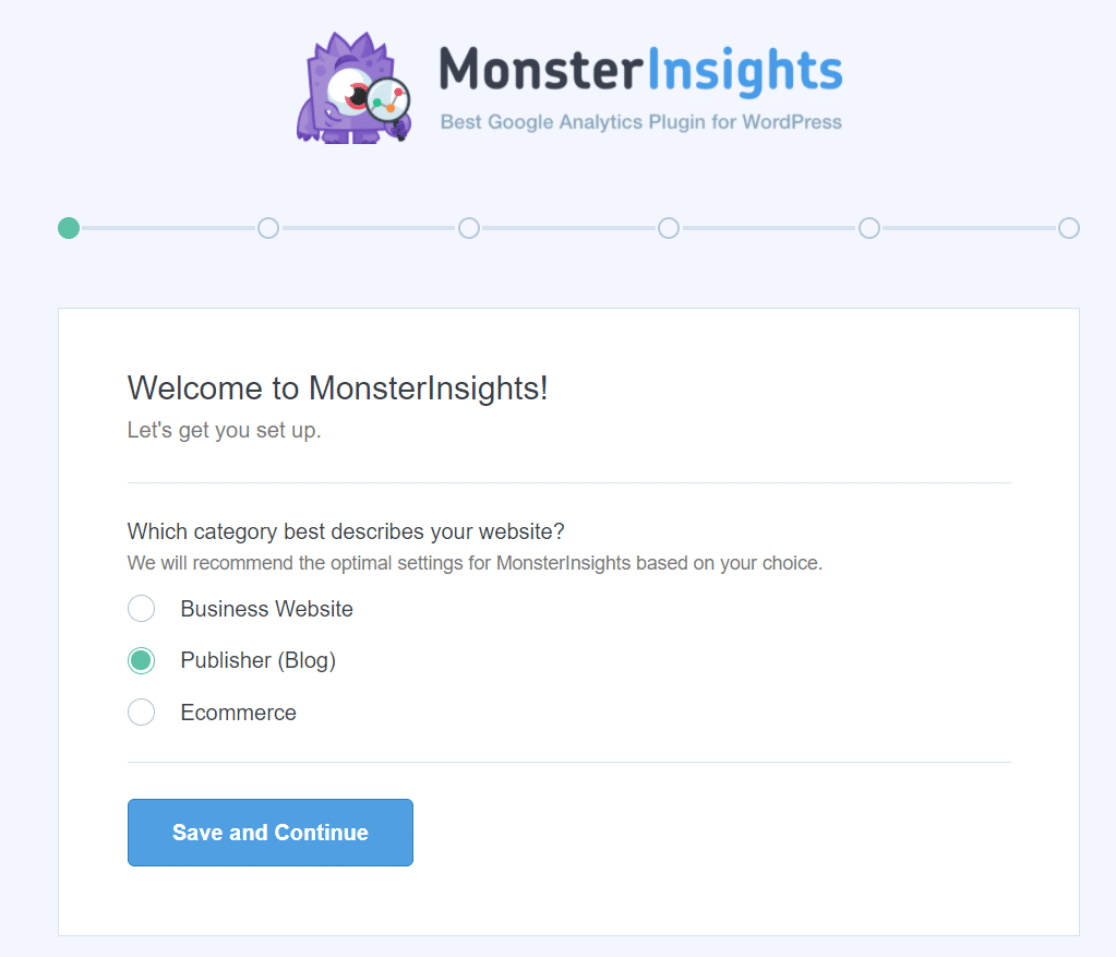
For detailed instructions, here’s our guide on how to set up Google Analytics in WordPress properly.
Once it’s set up, you can view the overview report for your site on your WordPress dashboard from the MonsterInsights Dashboard Widget.
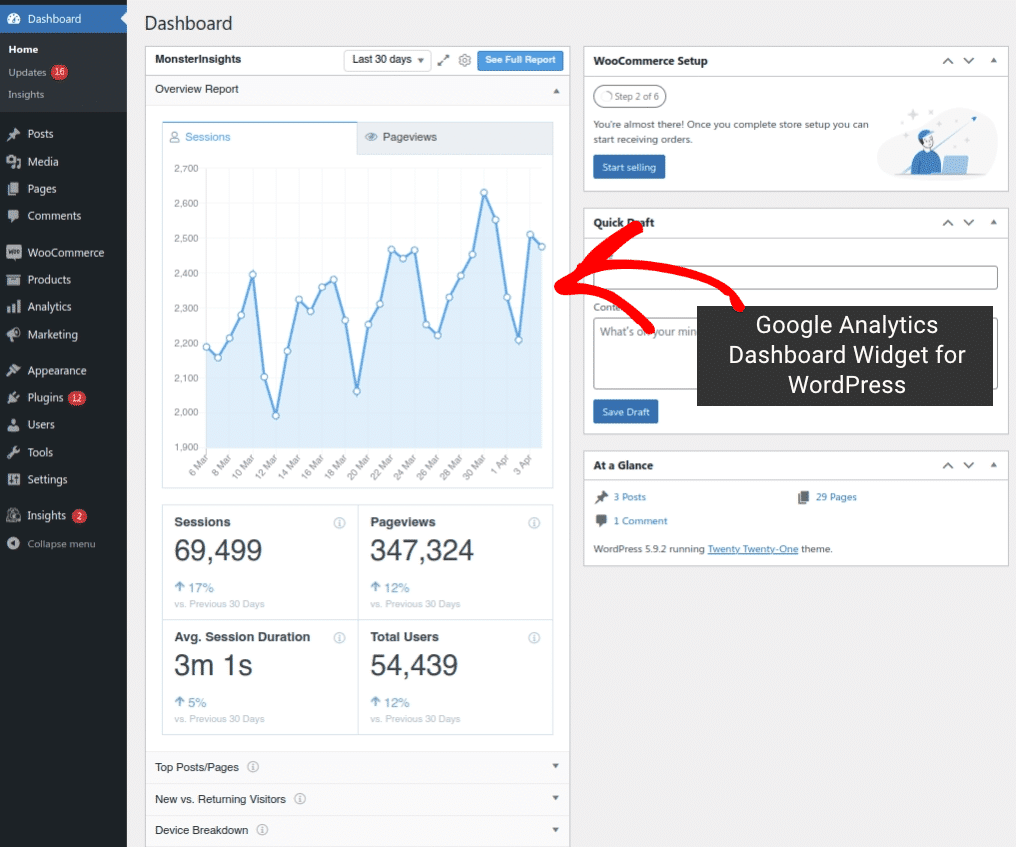
To view detailed reports for your site, you’ll need to go to Insights » Reports from your WordPress dashboard.
Step 3: Track Clicks
Now that MonsterInsights is up and running on your website and you’ve connected to Google Analytics, here are some ways MonsterInsights helps you track link clicks in GA4 and WordPress:
- Affiliate Link Tracking
- eCommerce Click Tracking
- Form Submit Button Click Tracking
- File Download Button Click Tracking
- Outbound Link Tracking
- Media (Video) Click Tracking
- Custom Link Click Tracking
Affiliate Link Click Tracking
MonsterInsights makes affiliate link tracking easy in WordPress. Use a plugin like Pretty Links to make your links look nice, give them all a trackable prefix (word in the URL), tell MonsterInsights what prefix you’re using, and watch that data come into your reports.
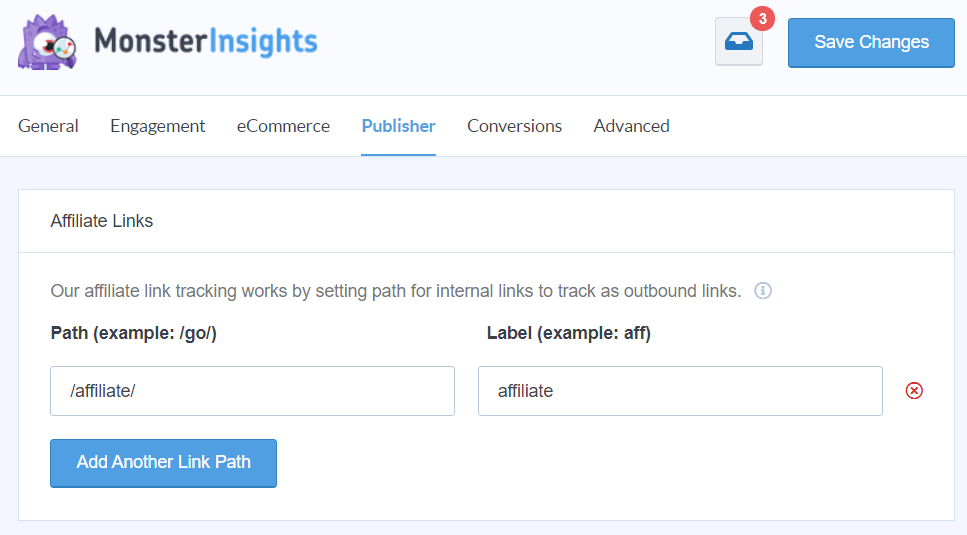
Or, if you’re using ThirstyAffiliates to manage your affiliate links, you don’t need to configure anything to track your affiliate links in MonsterInsights. We integrate right into that plugin to automatically track your affiliate links.
You can view your affiliate links tracking reports by visiting Insights » Reports » Publishers from your WordPress dashboard.
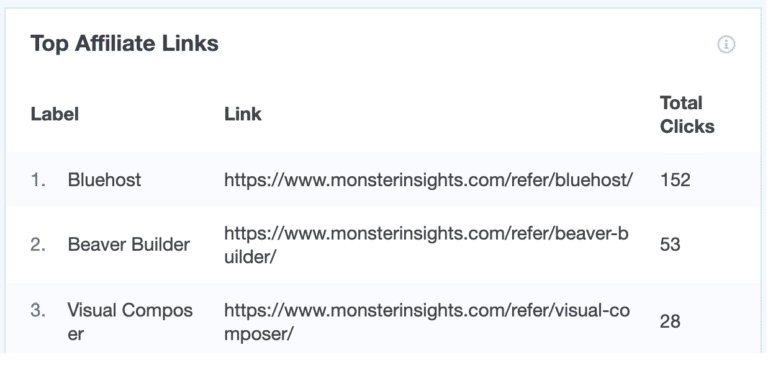
You can always click the View All Affiliate Links Report button at the bottom of the MonsterInsights report to view more data in Google Analytics.
If you want detailed instructions, here’s our complete guide on setting up affiliate link tracking.
eCommerce Click Tracking
MonsterInsights eCommerce tracking helps you to track all the data you need for your WooCommerce, Easy Digital Downloads, GiveWP, LifterLMS, MemberPress, MemberMouse, or Restrict Content Pro store. The eCommerce report will show the total Add to Cart button clicks, total Remove from Cart button clicks, and total purchase complete button clicks for your online store.
You’ll just need to install MonsterInsights eCommerce Addon on your WordPress site.
That’s it!
Now, you can view your eCommerce reports by going to Insights » Reports » eCommerce.
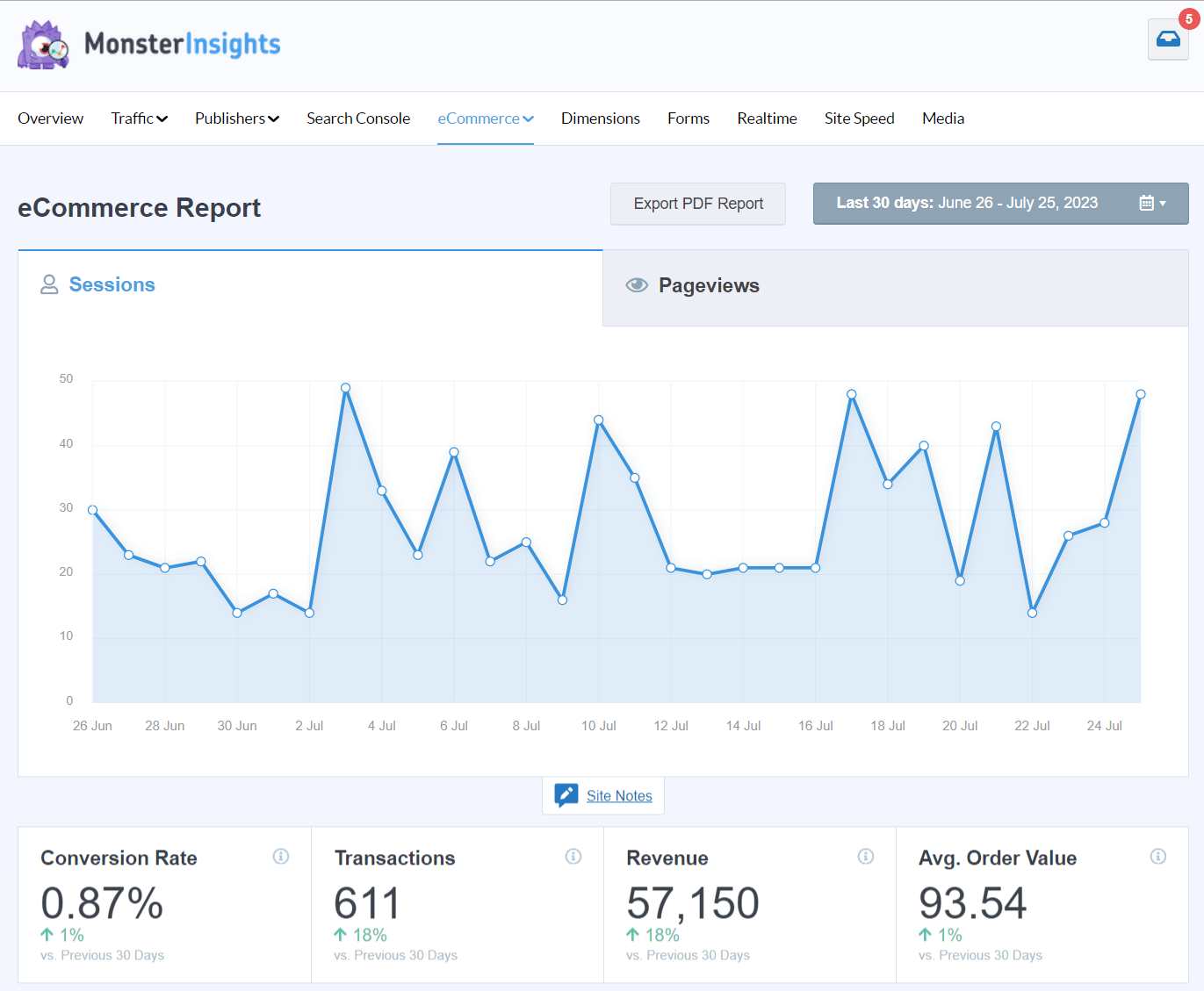
As you scroll down, you’ll see how many times the Add to Cart button was clicked and also the Remove from the Cart button, plus more metrics.

Want a funnel version of your eCommerce checkout report? You won’t have to build one yourself — just head to the MonsterInsights Funnel report:
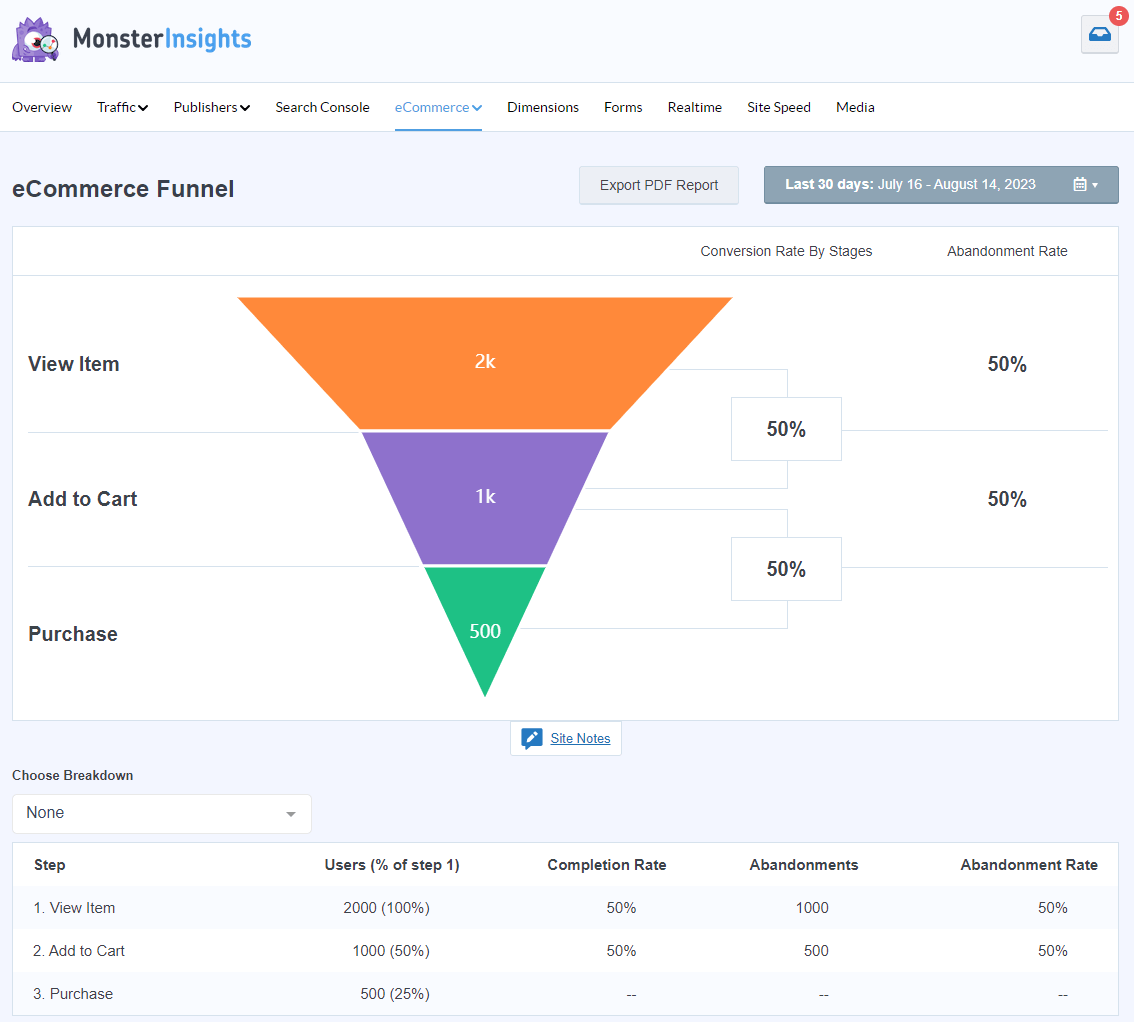
Form Submit Button Click Tracking
MonsterInsights comes with a powerful Forms Tracking addon to automate forms conversion tracking.
By enabling form tracking, you can view which forms trigger the most views and submissions. The number of total submissions for forms is counted when a user clicks the Submit or Send button for a form.
You’ll need to install and activate the Forms addon on your site to enable forms tracking. Navigate to Insights » Addons and find the Forms Addon. Then, click the Install button.
That’s it. You’ve completed the setup process. Now, you can view your form conversion reports by going to Insights » Reports » Forms from your WordPress dashboard.
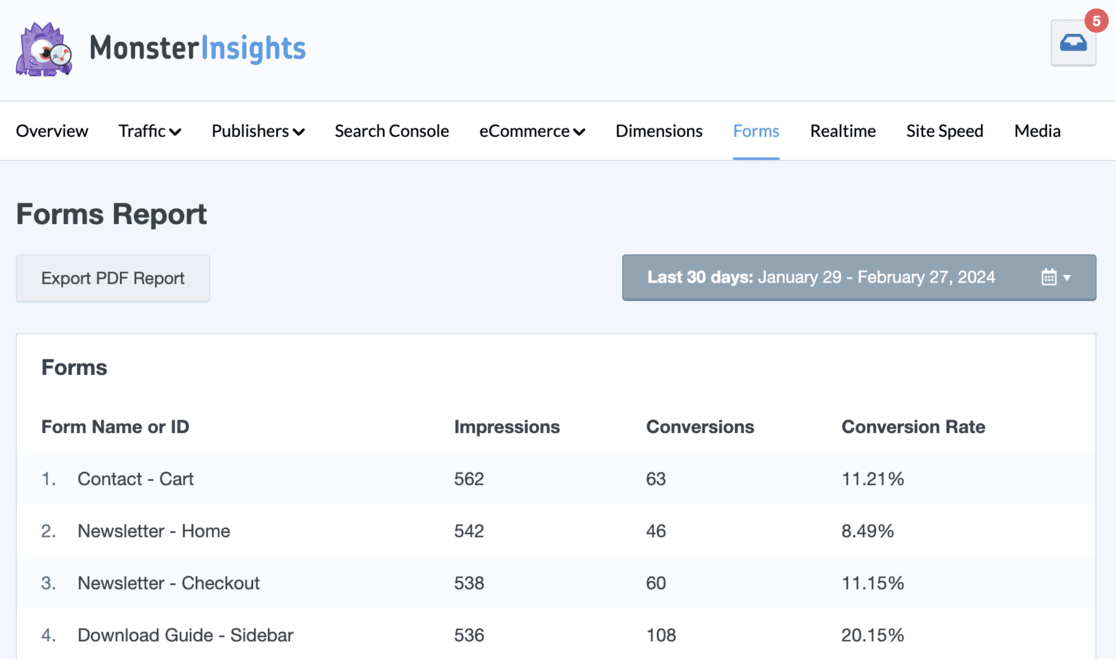
As you can see above in the screenshot, it’ll show you how many impressions and conversions each of your forms triggered. The number of conversions refers to your forms’ total clicks on the Submit or Send button.
For more on form tracking, check out How to Track Form Submissions in Google Analytics & WordPress.
File Download Button Click Tracking
If you’ve added downloadable resources to your WordPress site, tracking those downloads can help you discover your most popular resources and make decisions to grow your business.
MonsterInsights makes file download tracking very easy for WordPress users. You can set up this feature in just a few clicks.
First, you’ll need to go to Insights » Settings » Engagement. Next, scroll down to the File Downloads box.
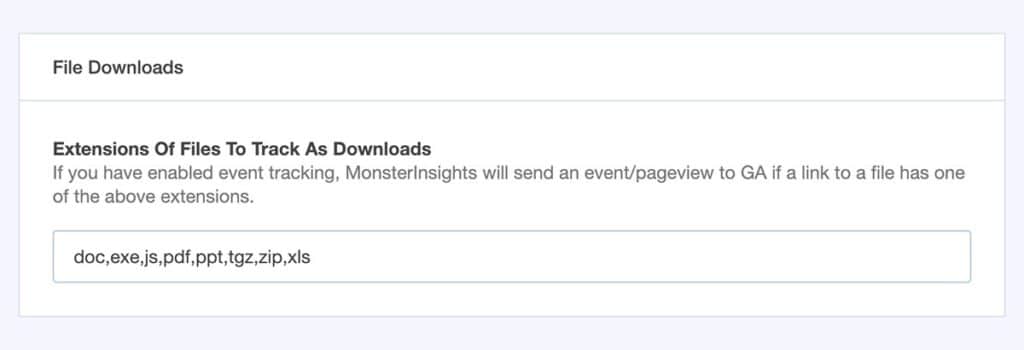
You can see the file extensions that MonsterInsights tracks by default. To track downloads of more file extensions, you just need to add them to the field, separated by a comma.
That’s it! The plugin will now track all the clicks users perform to download your resources.
Now, you can see your download reports by going to Insights » Reports » Publishers.
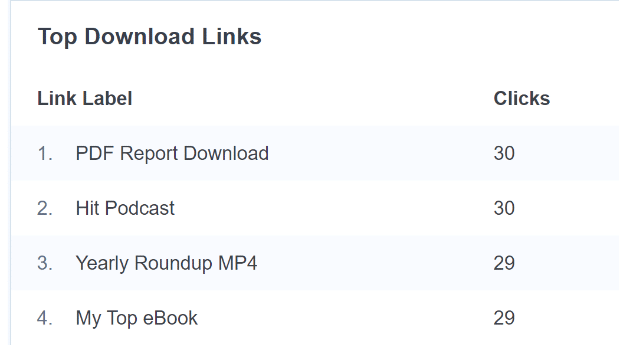
Outbound Link Click Tracking
MonsterInsights automatically tracks your outbound link clicks and shows you the reports in the Publishers report tab. But you’ll need to purchase at least the Plus plan to view the Publishers report.
Once you’ve set up MonsterInsights properly, you can go to Insights » Reports » Publishers from your WordPress dashboard to view your outbound links reports.
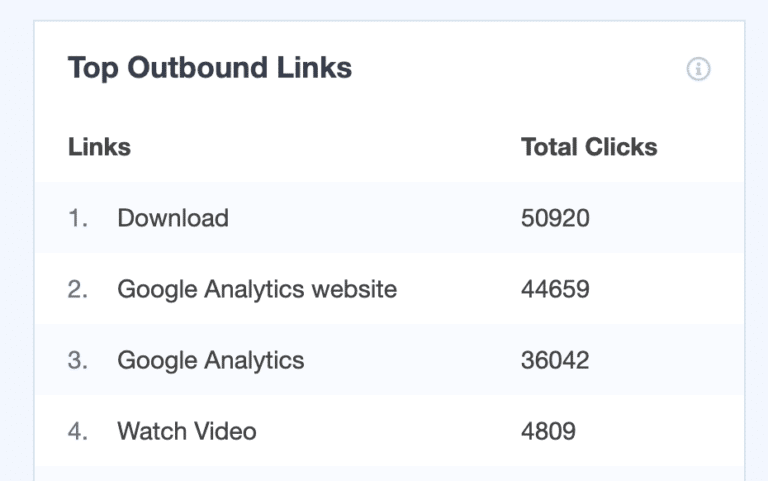
As you can see in the screenshot above, you can view your top outbound links with total clicks.
Need more outbound link click data? Check out How to Track Outbound Link Clicks in WordPress and GA4.
Media (Video) Click Tracking
Want to know how many people are clicking to play the embedded videos on your site and whether they’re watching all the way to the end? Set up video play tracking quickly and easily with the MonsterInsights Media Addon!
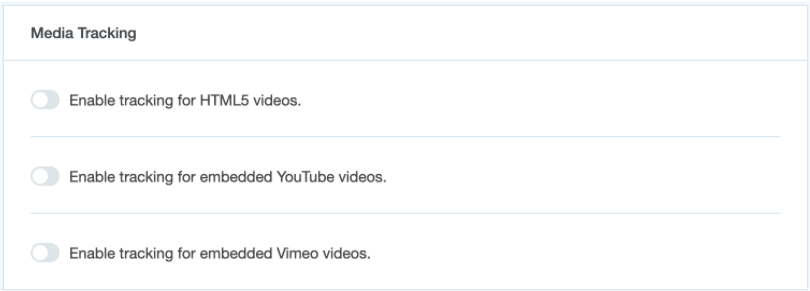
Just toggle tracking on for whichever type of videos you have embedded, then use Google Analytics to see your media tracking data.
Read How to Track Video Plays in Google Analytics (Easiest Way) for more on media tracking.
Custom Link Click Tracking
In addition to the automated options to track link clicks and button clicks discussed above, MonsterInsights lets you easily track your custom links, such as call-to-action buttons.
Our Custom Link Attribution feature allows you to easily add custom event tracking to your links.
Adding custom event tracking to your WordPress links with MonsterInsights is easy. All you need to do is add the following data-variable tags to the HTML of your link: Event category, Event action, and Event label:
<a href="https://www.monsterinsights.com" data-vars-ga-category="Custom Category" data-vars-ga-action="Custom Action" data-vars-ga-label="Custom Label">Example</a>
Once you add the tags, MonsterInsights will send the link click data to Google Analytics 4 for you to use in your reports.
For a full tutorial on custom event tracking, check out How to Set Up Google Analytics Event Tracking in WordPress.
Link Click Tracking with Google Tag Manager
If you’re not using WordPress, you’ll need to use Google Tag Manager to track your link clicks. Let’s take a quick look at the general steps you’ll follow any time you want to set up tracking in GTM.
For this tutorial, we’ll assume you have a Google Tag Manager account and have installed the GTM code into your website.
Each link tracking setup is slightly different, but we’ll review the general tracking steps.
Step 1: Create a Link Click Trigger
First, you want Google Tag Manager to start “listening” for clicks on your site. To do that, you’ll want to set up a new trigger.
To start, click on Triggers:
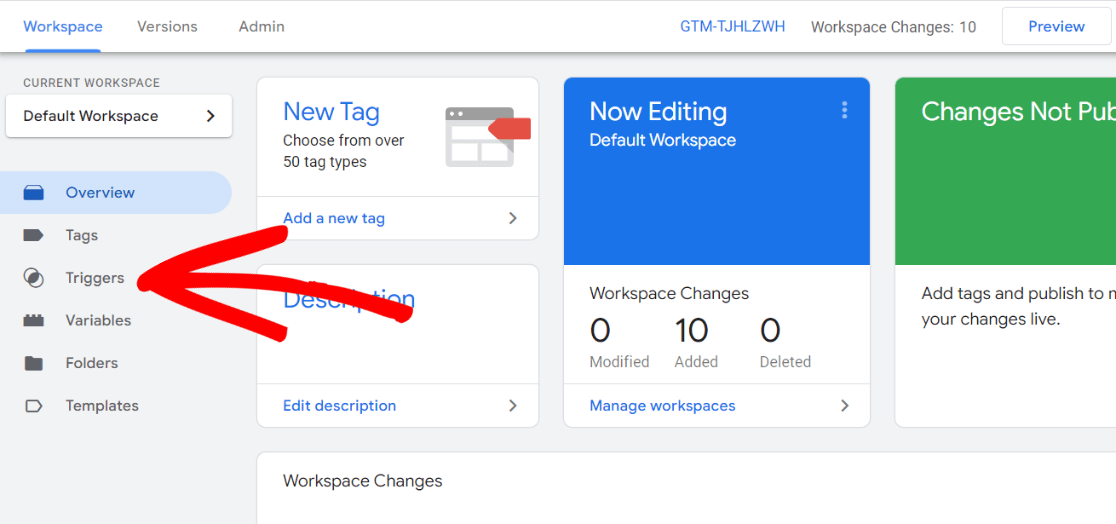
Then, click the New button:
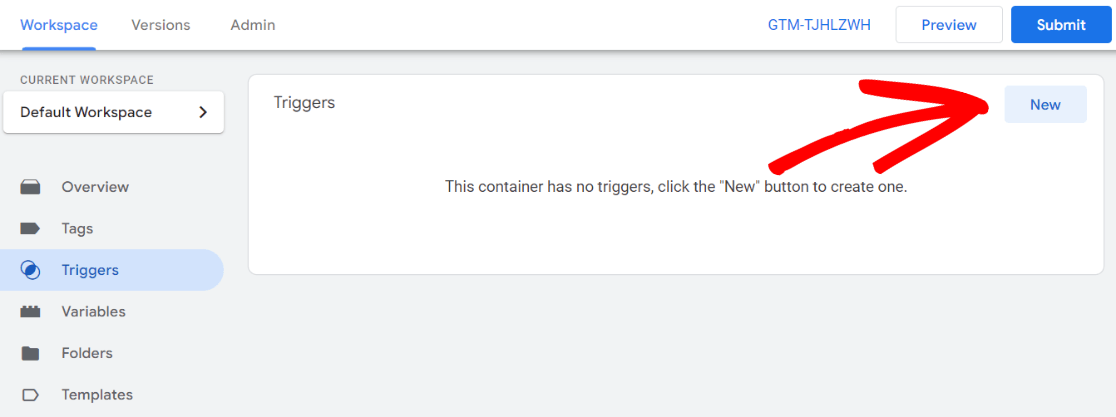
Next, give your trigger a name like “all link clicks” and click in the box to edit it:
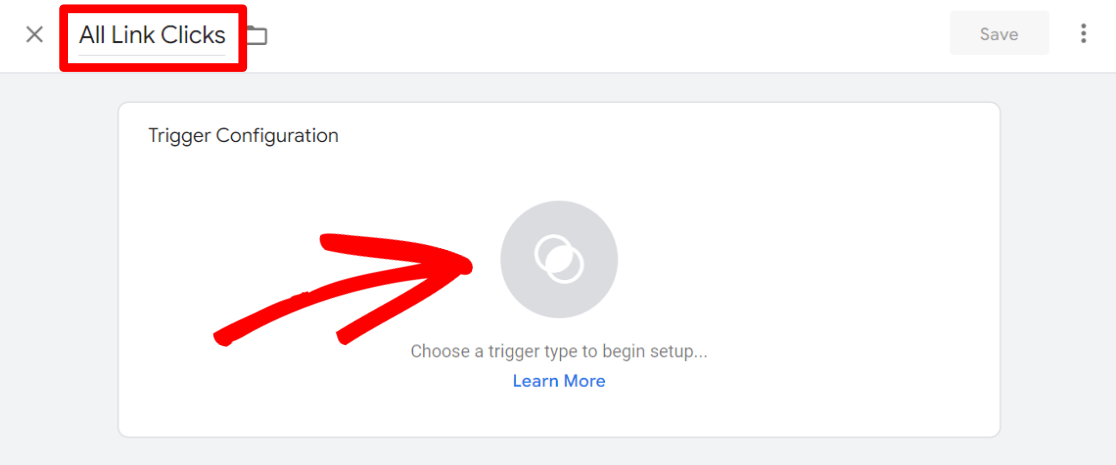
Now, click Just links:
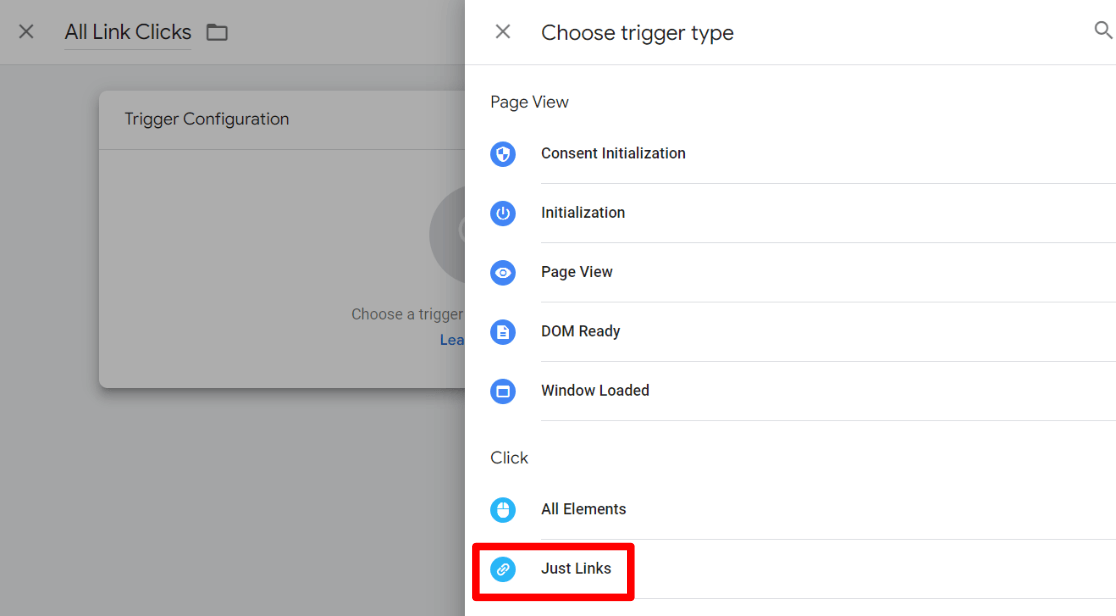
Finally, leave everything how it is and click Save:
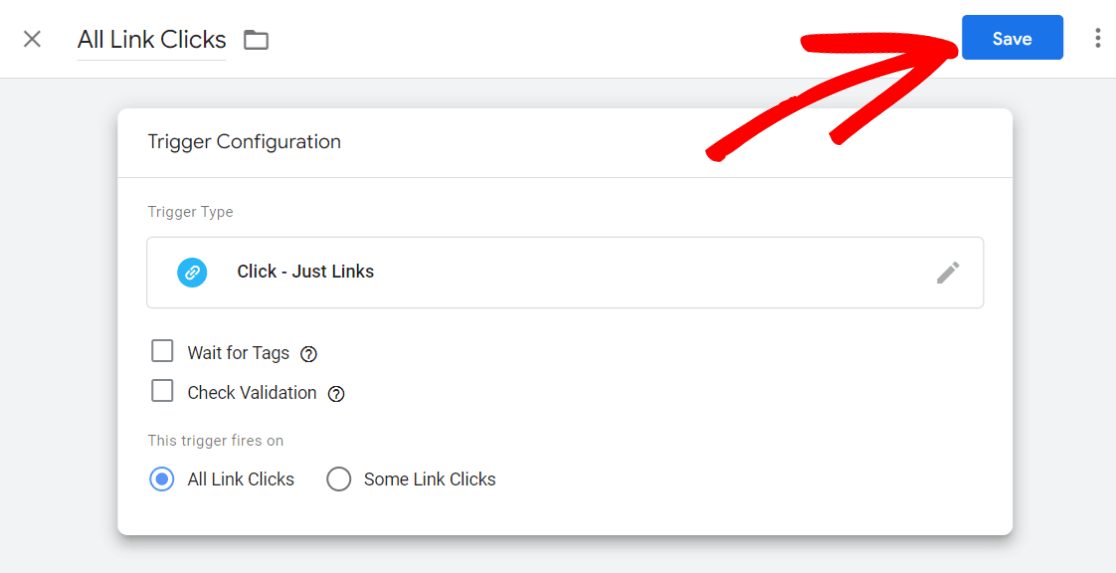
We’ll update this trigger later with a specific click, but for now, we want it to track all clicks for testing purposes.
Step 2: Enable Click Variables
Now that you’ve turned on click tracking, you need to tell Google Tag Manager which clicks to track. To help you out, GTM comes with several built-in variables you just have to enable to use.
To enable those variables, head to Variables and click Configure:
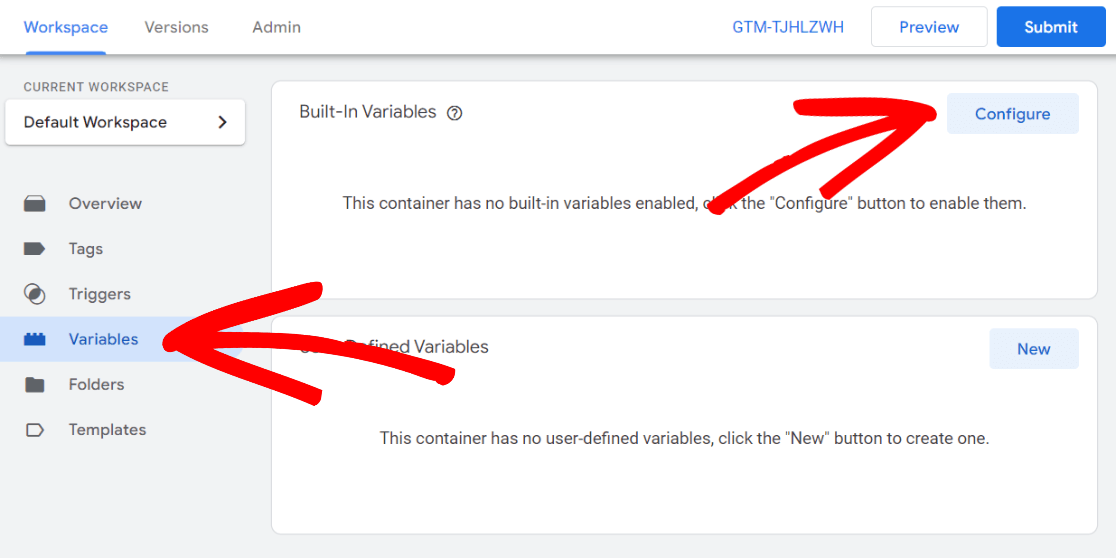
Now, you can check the ones you’d like to use from the list.
Don’t know which ones you’re going to need? The items under Pages and Clicks are the most common ones you’ll need. If you plan to set up form submission tracking, check all of the Forms ones. Want to track video clicks or scroll tracking? Enable Video and Scrolling options.
There’s no harm here in enabling some that you won’t use.
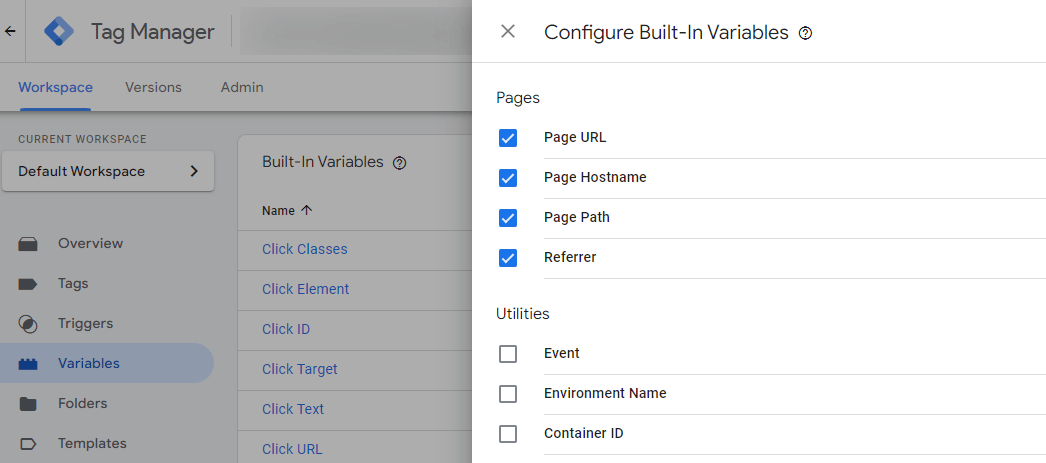
Step 3: Use Preview Mode to Find a Click
Now, it’s time to set up tracking for the specific link or type of link you want to track. To do that, head back to your Google Tag Manager home and click the Preview button:
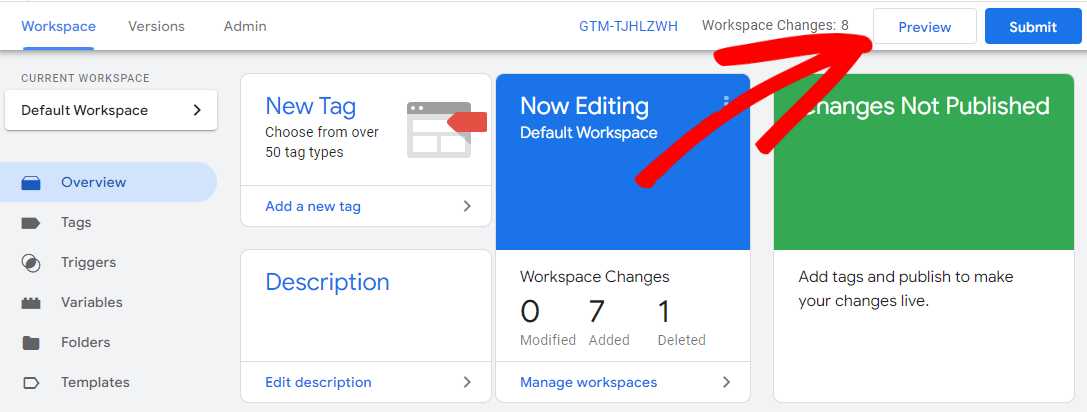
A new window will open to connect to your site. Make sure to keep both your Google Tag Manager and new website preview windows open.
Now, let’s say you want to track outbound link clicks in your social media box on your Instagram icon to see how many website visitors are clicking over to Instagram to follow you.
In your website preview window, we’ll click the Instagram icon.
Back in your Google Tag Manager window, you’ll see an event pop up in your sidebar called Link Click, because the All Link Clicks trigger you set up before is watching for all link clicks. Click on Link Click, then toggle to the Variables tab.
You’ll find the information you need to create your tracking tag here. We’ve found that the click text for that icon is “INSTAGRAM,” and the click URL is the Instagram profile. We can use these to create our tracking tag.
Other variables you should look at closely for setting up additional click tracking are Click classes and Click ID.
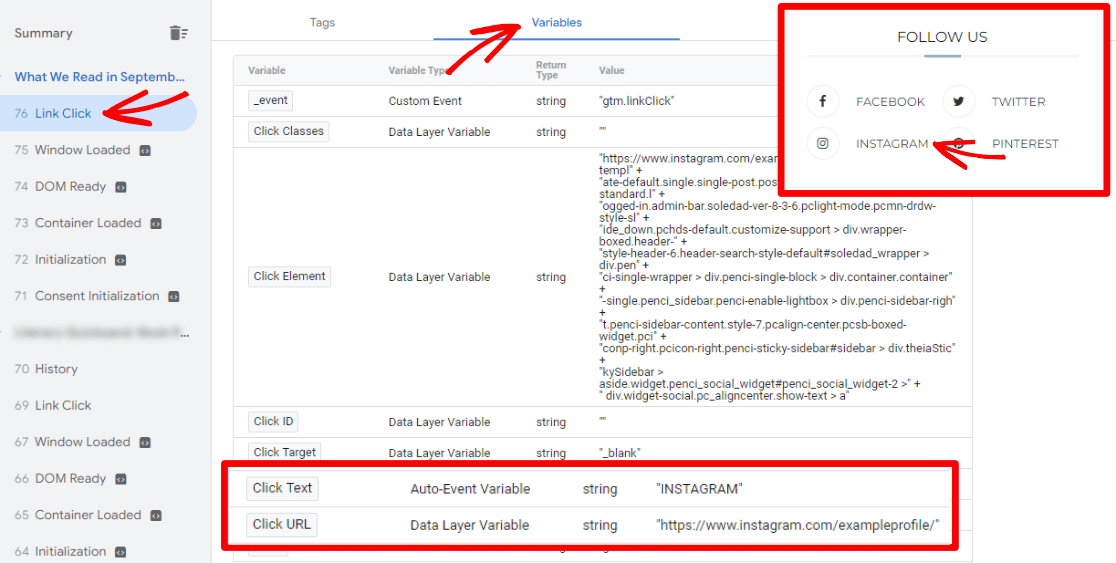
Step 4: Update Your Event Trigger
Now that you know what variables are firing on your website when you click on that Instagram icon, we’ll go back and update that trigger you made so that it’s tracking Instagram icon clicks.
So, navigate back to the Triggers tab and click on the All Clicks trigger you created in step 1:
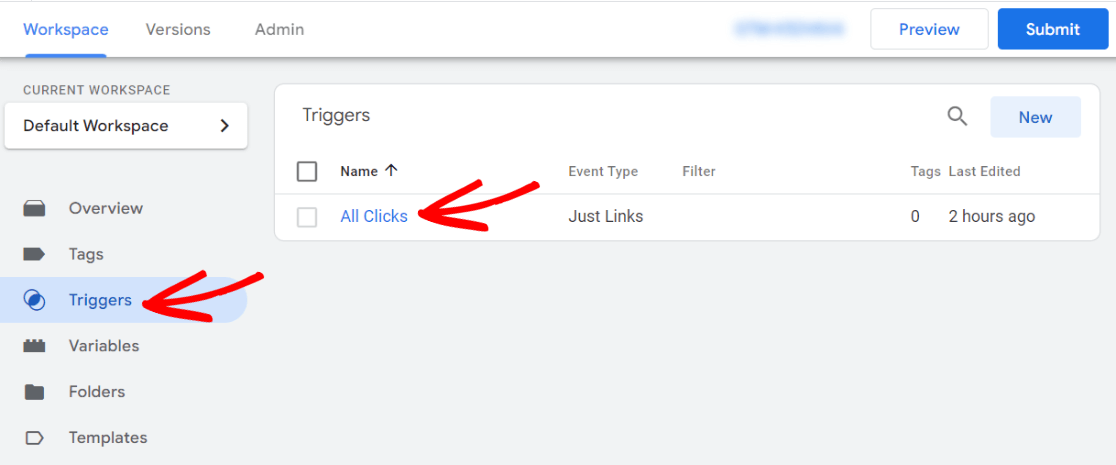
Then, click anywhere in the Trigger Configuration box to edit it:
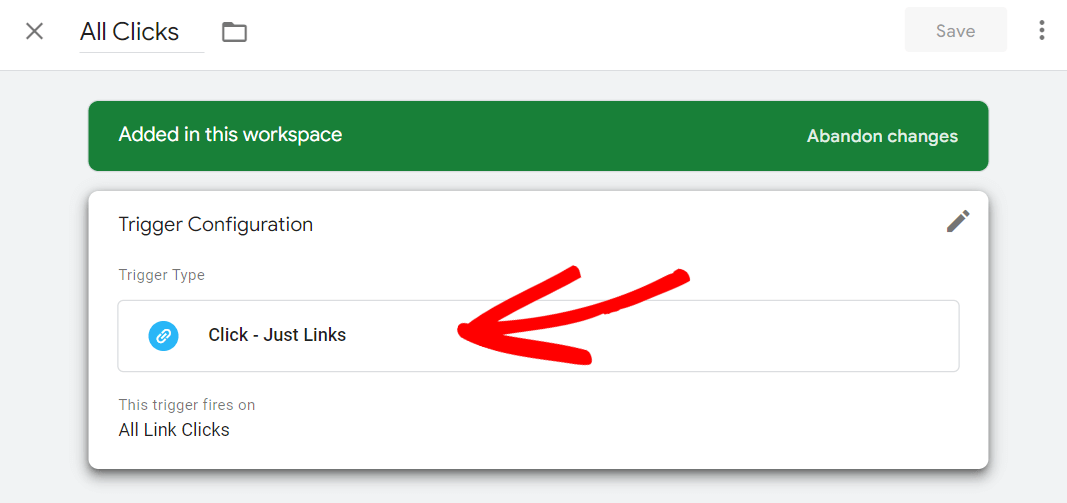
Now, we’re going to leave our trigger type as just links because the Instagram icon does have a Click URL (link). However, we want it to fire only on the Instagram click, so we’ll choose Some Link Clicks.
Remember when we found that the click text on our icon is “INSTAGRAM”? We’ll use that here to set the condition to Click text equals INSTAGRAM. We’ll also update the name of the trigger to Instagram Click. Click the blue Save button when you’re done:
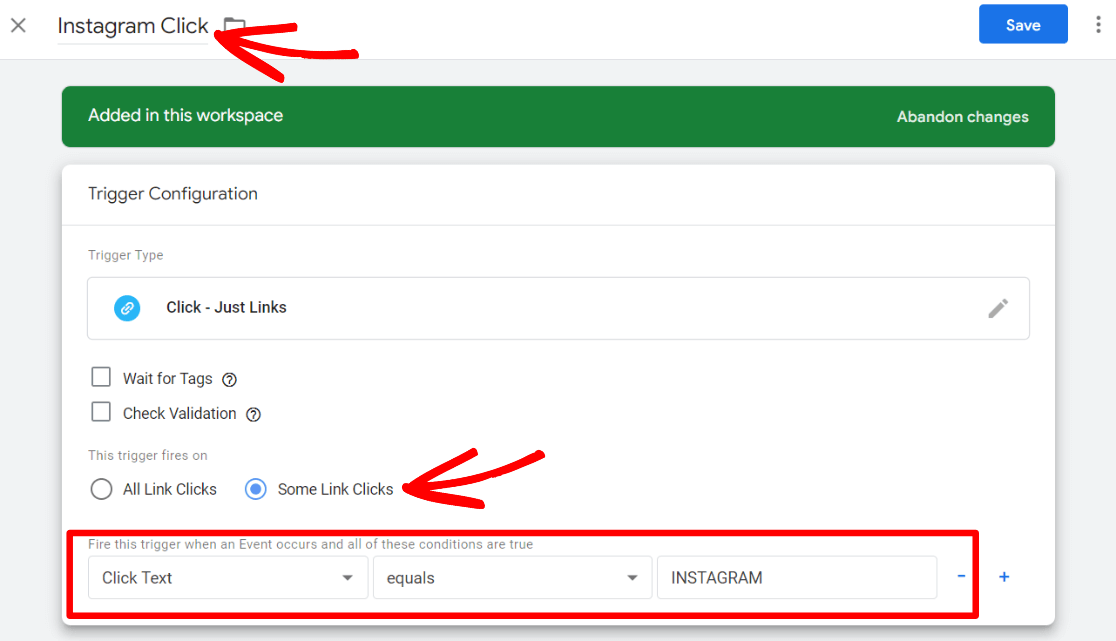
Step 5: Create a Tag
You can create your new tag now that you know what you’re tracking and your trigger is ready. Head to Tags » New:
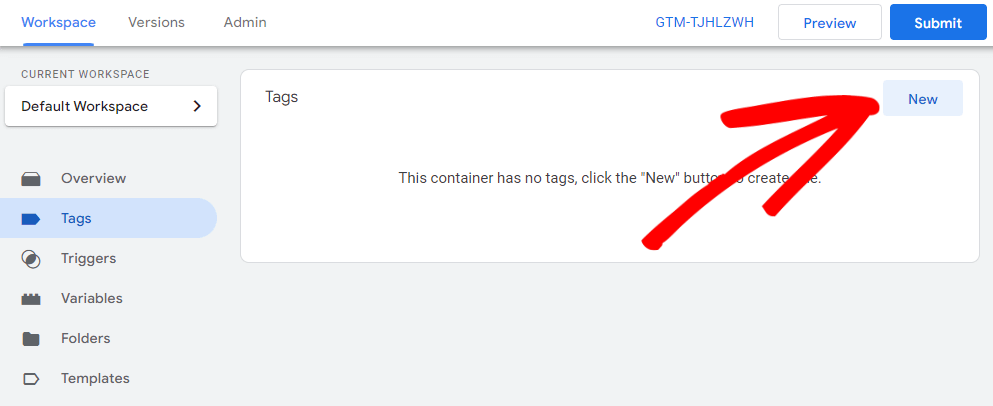
We’ll go ahead and call our tag Instagram Click, then click into the Tag Configuration:
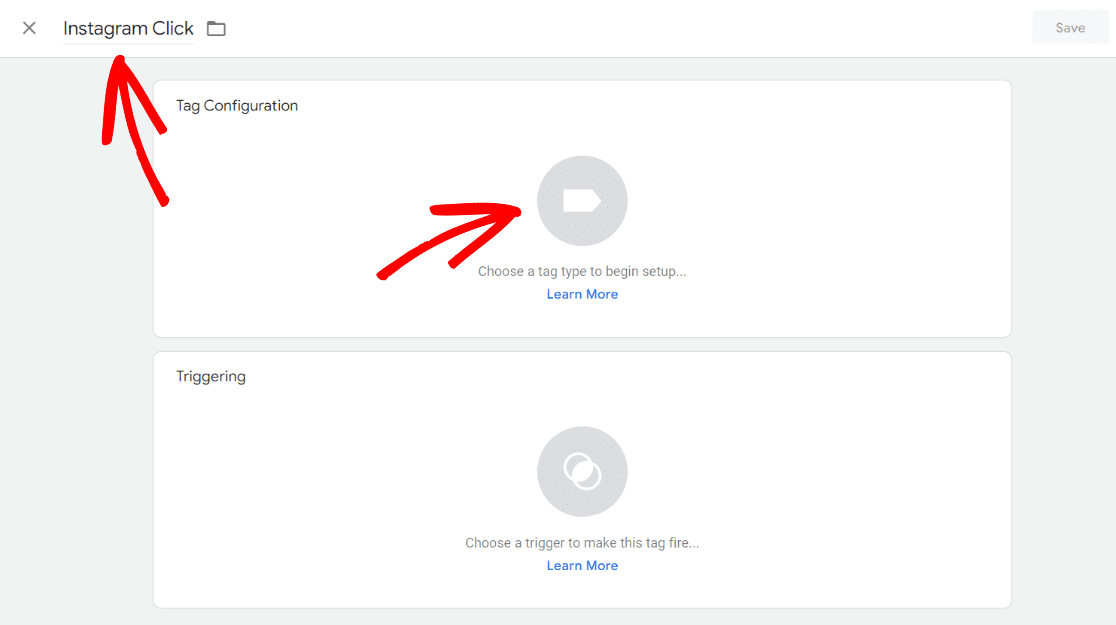
Then, choose the Google Analytics tag type, then Google Analytics: GA4 Event.
The Tag Configuration screen will open. Enter your Measurement ID, then create an Event Name. The name can be whatever you’d like — just make sure it doesn’t match an event that Google Analytics 4 already uses, and remember it so you can use it later.
In our example, we might use insta_click.
(Make sure you already have Google Analytics set up as a tag and tracking page views – for instructions on that, check out How to Add Google Analytics 4 (GA4) to Google Tag Manager.)
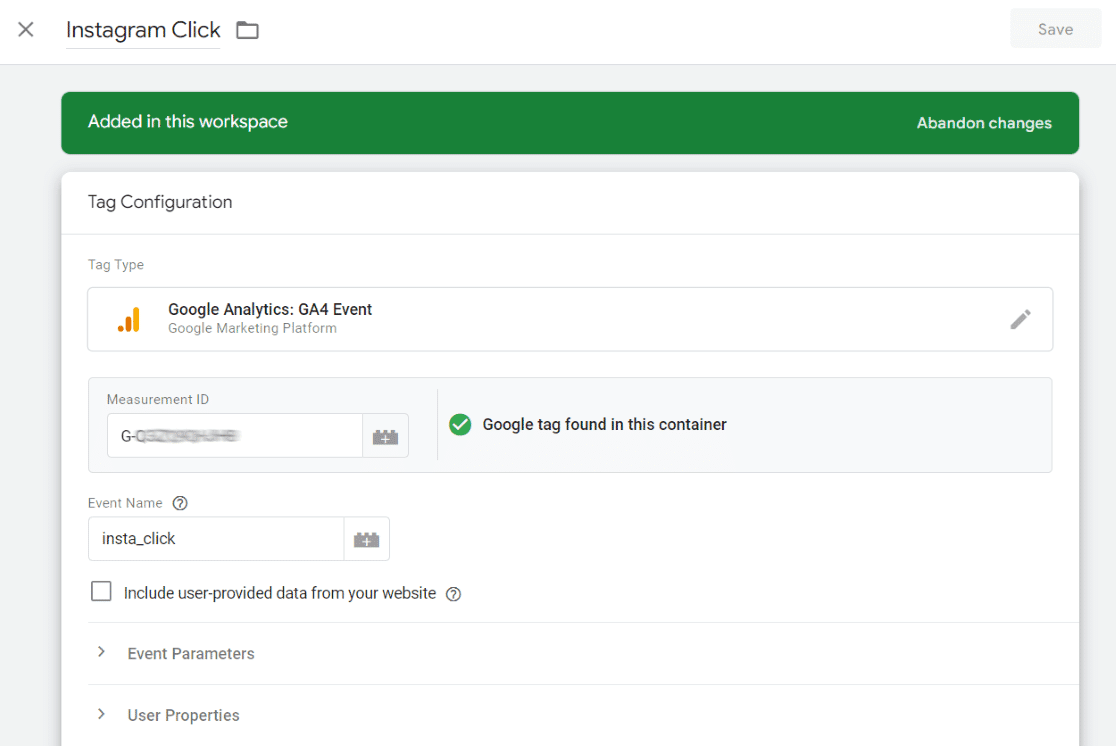
Next, scroll down to the Triggering section:
![]()
Choose the Instagram click trigger you created:

Finally, click the blue Save button.
Your click tracking tag is ready! Don’t forget to go back and click the Submit button in your Google Tag Manager workspace to push your changes live:

Step 6: Create a Custom Dimension in GA4
You’re almost there! The final step is to create your new custom dimension in Google Analytics 4 so that you’ll see that insta_click event show up in your reports.
To do that, we’ll open GA4, click on the Admin cog, then find Custom definitions in the Data display box:
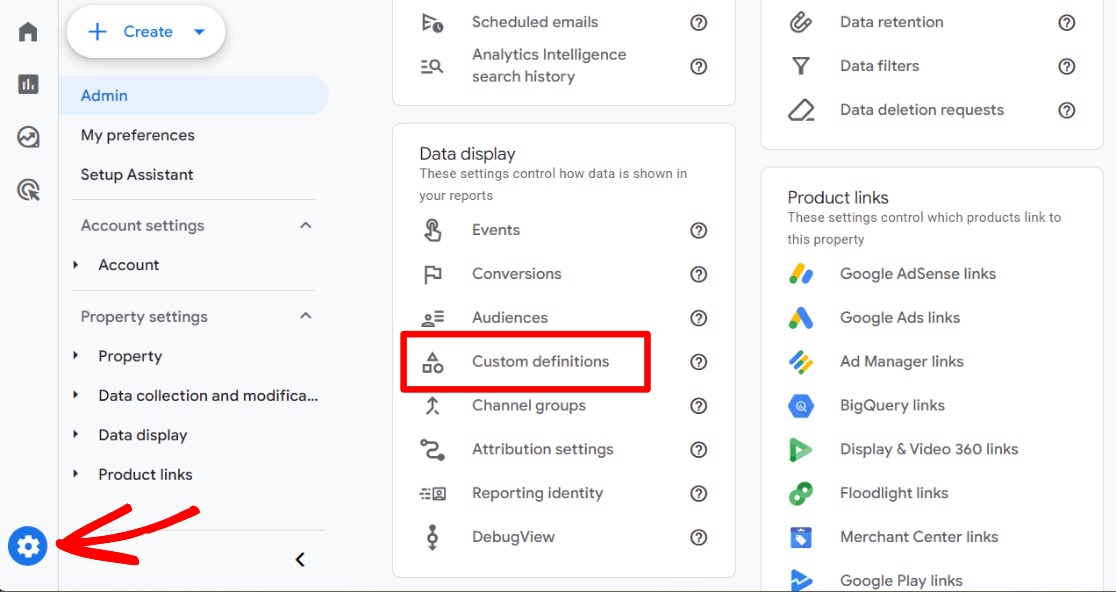
Next, click Create custom dimension. In the box that opens up, use whatever name you’d like for your dimension name, leave the Scope as Event, and type in the Event name you chose in step 3 (insta_click):
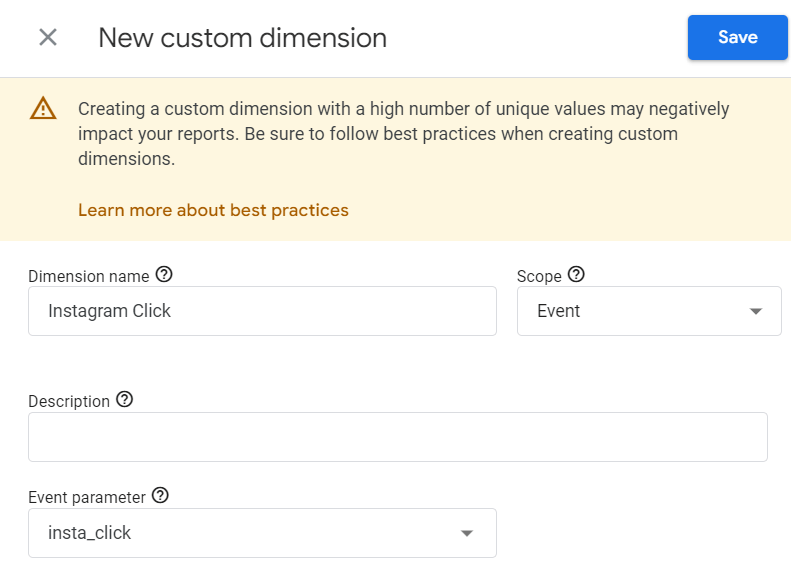
Click the Save button.
With that, you’ve successfully set up Google Analytics link click tracking in Google Tag Manager! You’ll need to go through the above process for any other clicks you want to track.
Remember, MonsterInsights tracks outbound link clicks out of the box, so you’d be able to see those Instagram profile link clicks in Analytics without any GTM setup.
Start Tracking Your Link Clicks Today!
Google Analytics Click Tracking FAQ
How do I track clicks in Google Analytics?
If you’re using WordPress, you can use a plugin like MonsterInsights to automatically track clicks in Google Analytics. If you’re not using WordPress, you’ll need to use Google Tag Manager.
Can Google Analytics track how often a link is clicked?
Yes, but only if link click tracking is set up! You need to tell Google Analytics which links to track before it’ll tell you how often they’re clicked.
What is click tracking in SEO?
Click tracking in SEO means tracking clicks on certain links or elements on your site, and then using that data to improve your website and overall SEO.
We hope this article helped you to learn how to track link clicks in Google Analytics for your WordPress site.
If you liked this article, you might also want to check out:
45 Best WordPress Plugins (Most are FREE)
How to Set Up Google Analytics Custom Event Tracking
How to Set Up GA4 Scroll Depth Tracking (GA4 + WordPress)
Google Analytics 4 eCommerce Tracking Tutorial [WordPress]
And don’t forget to follow us on Twitter, Facebook and YouTube for more helpful Google Analytics tips.

Hey! Is a click to call link considered a custom link by MonsterInsights? Thanks!
MonsterInsights custom tracks all tel: (call links) as a custom event. There’s no need to setup anything for that.